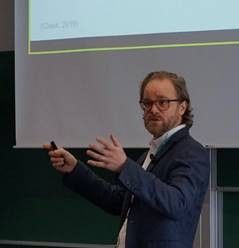Maths, Minds, and Motorways: Understanding Human Behaviour Through Models: Inaugural Lecture by Professor Gustav Markkula
- Date: Tuesday 16 September 2025, 16:30 – 17:30
- Location: Esther Simpson Building
- Cost: FREE
Understanding Human Behaviour Through Models Esther Simpson Building LT1.01 Reception with refreshments in the ITS building social space before the talk from 15:45
In this inaugural lecture, we will hear from Professor Gustav Markkula where he will discuss how human behaviour can be understood and predicted using mathematical models, both in general and with a particular emphasis on his own research in modelling of human road users. Why is it useful to make mathematical models of human behaviour, how can it be done, with methods spanning from neuroscience to machine learning, and what are the current limitations, future possibilities and ethical aspects to consider?
15:45 – 16:20 – Drinks reception in ITS social space
16:30 – 17:30 – Lecture at Esther Simpson room 1.01
17:30 - 1800 – Back to ITS for refreshments
This event is open to everyone. To register your attendance at this lecture, please get your FREE ticket HERE
Biography

Professor Gustav Markkula is Chair in Applied Behaviour Modelling at the University of Leeds, where his work sits at the intersection of engineering, neuroscience, and human behaviour. With a background in engineering and cognitive science, his research focuses on modelling human decision-making and motor control, particularly in the context of driving, transport safety, and autonomous systems. He previously spent more than a decade in the automotive industry at Volvo, working as a systems engineer, project manager, and technical specialist on R&D projects relating to driving safety, driver distraction, human–machine interfaces, and driver behaviour. During this time, he also completed a PhD on mathematical modelling of driver behaviour to support virtual testing of safety systems. Moving to the University of Leeds in 2015, he now leads interdisciplinary collaborations that bridge psychology, artificial intelligence, and transport technologies, contributing to safer road traffic and more human-aware automated systems. His work is widely published and has informed both academic understanding and real-world applications in mobility and human–machine interaction. As a key part of the team at Virtuocity (the University of Leeds Driving Simulator), he helps steer research strategy and develop cutting-edge simulation capabilities for studying human interaction with future mobility systems.
If you have any queries about this lecture, please email l.naar@leeds.ac.uk

